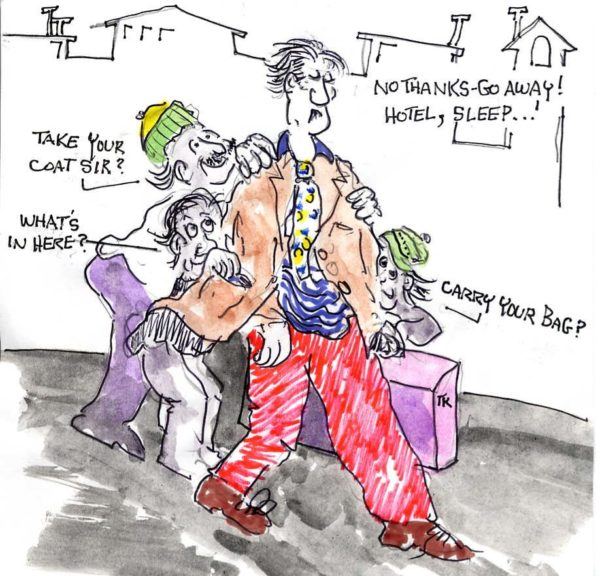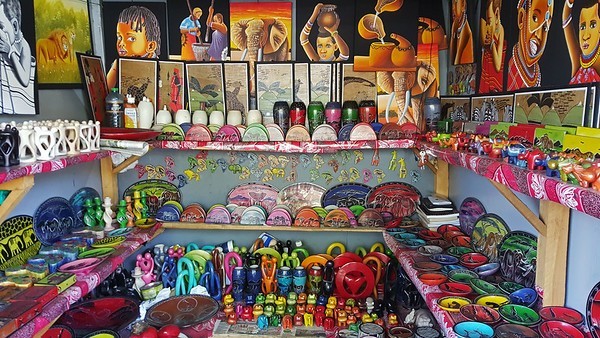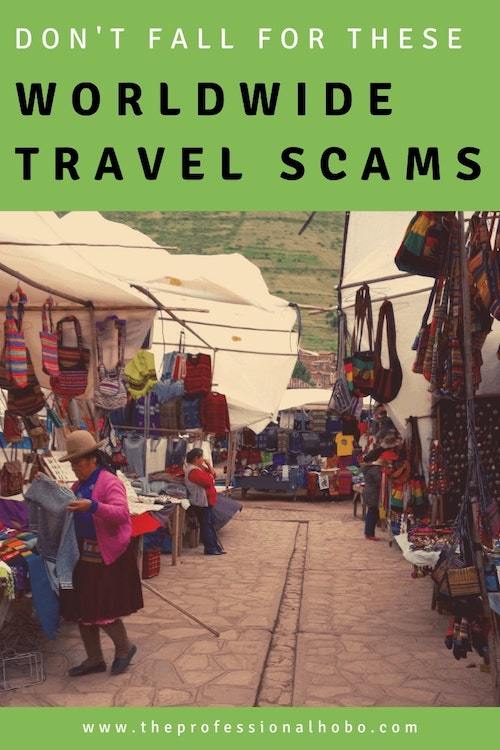It can happen anywhere, any time, in the blink of an eye, and before you know it you’ll be wondering how it could have happened to you. This article isn’t about theoretical situations that you may or may not encounter on the road; below you’ll read about 24 classic travel scams, as experienced by this panel of pro travelers!
Brace yourself. None of us are immune (that is, until you read this article and learn from our travel mistakes). Once you know what to look for, you can spot these travel scams a mile away, and with the tips here, you can avoid them expertly.
(See Also: Travel Security: how to protect all your valuables when you travel)

PICKPOCKET AND THEFT SCAMS
Pickpocketing can happen anywhere in the world, in both developed and developing countries. It can even happen in your home town! It just tends to be that targets for pickpocket and theft are foreigners by virtue of often being in touristy or crowded places (and also characteristically distracted).
So read up on the below experiences, and take heed, every day.
Scuffed Pants / Dropped Keys Distraction Pickpocket

Michael Brein earned his PhD in social psychology, and is dubbed “The Travel Psychologist”. He is an author, lecturer, consultant, travel storyteller, adventurer, and publisher of travel books and guides.
The scam he describes here has been adapted from his recent book, Travel Tales: Michael’s Best 150.
“I was riding the Madrid metro, standing in the center part of the car. I was all loaded down with an attache case, backpack, and rolled up posters. I had stuff in my hands and in all my pockets as well. I was, for all intents and purposes—totally oblivious.
Suddenly I noticed my trousers had been scuffed, apparently accidentally scuffed by a seated passenger’s shoe on my left.
My gaze focused now on this person taking hold of the scuffed portion of the pant leg in one hand, and brushing away the scuff with the other, all the while maintaining an apologetic demeanour. I turned around and noticed two other guys standing directly behind me, too close for comfort.
The Metro came to a stop. The door opened. The three guys—apparently Spanish gypsies—immediately flew out the door, running. I suddenly realized that I had been a pick-pocketing victim!”
Michael was saved by a pickpocket proof safari style jacket with no less than 22 pockets; the perpetrators didn’t have enough time to find a pocket with something valuable in it before Michael was on to them. But he’s still quite sure this was a pickpocket trio, and in fact saw them a few days later on the metro, pulling off a similar scam on somebody else. This time, they dropped keys on the floor as their distraction.
How to Avoid this Pickpocket Scam: Always scan your surroundings and be aware of everything happening around you. And if you find somebody distracting you, snap out of it! Look where they don’t want you to, to ensure you’re not being robbed.
It also helps not to look like a wealthy tourist. Leave your expensive jewelry and watches at home, and keep your expensive camera under wraps. Pickpocket proof clothing helps too.
Pickpockets Masquerading as Aggressive Vendors
John Z. Wetmore produces the cable television series, “Perils For Pedestrians“, which looks at problems confronting pedestrians around the world, and solutions to those problems. He watched as his friend was pickpocketed in Bogota, Colombia.
“A friend of mine fell victim to pickpockets while I was following him just ten feet away. Two young men pretending to be street vendors aggressively pushed their wares, then quickly disappeared. When we got back to the hotel, he discovered that his jacket pocket had been unzipped and his phone stolen.
There were a couple of red flags. The pickpockets were way more aggressive than normal street vendors, who would have given up much sooner when rebuffed. They also were bumping and jostling him, which meant that he was less likely to notice when they entered his pocket.
The natural reaction when confronted by an aggressive vendor you don’t want to bargain with is to ignore them, which works to the pickpockets’ advantage. Perhaps they might have been discouraged if he started looking directly at them, or had started yelling loudly at them. Fortunately, the phone in his outer pocket was a decoy phone — an old model that was worth very little. His real phone was safe in an inside pocket.”
How to Avoid this Pickpocket Tourist Scam: In retrospect it was obvious what was happening above, but in the moment not so much. Heed any wee red flags that pop into your head. While there is some strength in numbers, this particular scam happened while two friends watched! Be aware, and don’t let anybody hassle or bump you.
Also, consider keeping a decoy wallet in your outside pocket with whatever spending money you plan on using that day. Keep your real wallet and cards further from prying hands.
Crowded Bus Pickpocket

James Ian has traveled to 78 countries and all seven continents. Mostly safely. He now blogs at Travel Collecting, helping people have interesting and meaningful experiences when they travel.
He was unfortunately parted with his phone on a Guatemalan bus.
“I was sitting near the back of a crowded bus in Guatemala. There are bench seats and people squeeze together tightly to fit in. The buses are old converted U.S. school buses and the back of the bus also opens up as a second door. The guy on my left was squeezed up against me (which was not unusual) and was wriggling a bit (which was also not that unusual, since there were people trying to move up and down the aisles).
We stopped for a while, and he wriggled some more, which I thought was a little odd since no one was walking past, but it was crowded, and he smiled at me when I looked at him, which made me feel more relaxed. Then he suddenly stood up and jumped off the bus out the back door.
That’s when the warning bells started clanging loudly. We had been stopped for a while – why didn’t he get off the bus when we arrived? I checked for my phone, which had been in my left pocket, and sure enough, it was missing. I had been pickpocketed!”
How to Avoid this Pickpocket Scam: Don’t keep anything in your pockets when you’re on the move. Also, if you’re on a crowded bus and somebody is wriggling around next to you for no apparent reason, check for foul play.
(See also: 7 Travel Mistakes I Made in Guatemala)
Distraction Theft Scam
Alex Trembath and Lisa Pool are a couple from the UK to took a year off work together in their 30s to travel the world. Now, they run Career Gappers, which inspires and equips people to take their own travel career breaks. Shortly after arriving in Buenos Aires, Argentina, they fell prey to a classic distraction theft scam; this one involving bird poop.
“While we were walking through a park, I was just in front of Lisa. Somebody threw a substance that looked like bird mess on my backpack – neither of us saw them throw it, and we thought it was genuine. A few steps ahead, a woman appeared, saying she had seen what had happened and offered to help us clean up the mess.
We stopped at a bus station to take the bags off. In order to get to our big backpacks, we first needed to take off the small bags on our front. These bags contained most of our valuables. The moment we took off the small bags, the woman turned us around, distracting us while someone else grabbed our bags and gave them to someone waiting in a taxi, who drove off with them.
It all happened in a few seconds and as soon as we realized, it was too late. We lost our passports, lots of cash, laptops, cameras, e-readers, sentimental items and much more.”
(Learn more about what happened and how they got over it here). Alex also notes that South America gets a bad rap and isn’t as dangerous on the whole as it is reputed to be; they spent five months in South America and this was their only bad experience.
How to Avoid the Distraction Theft Scam: While Alex and Lisa were aware of this travel scam, their guard was down after an overnight bus ride and the scam was professionally executed. Sadly, it’s important to beware of strangers offering help, and even more important to never lose sight of (or contact with) your bags containing valuables.
SCAMS INVOLVING NEW FRIENDSHIPS
There’s nothing more rewarding than making local friends abroad. A cultural win! The problem is, sneaky locals can use this knowledge to take advantage of unsuspecting travelers. Below are a few ways it can happen.
The Impromptu (Fake) Guide
James Ian (whose phone was stolen on a Guatemalan bus) also had a dodgy experience in Casablanca, Morocco.
“I was traveling with someone else, and we were approached by someone to be our guide. He said he could take us to a special market that not many people knew about. He took us on a public bus, which seemed like a fun adventure.
He did indeed take us to a market, though it was nothing special. As he took us into shop after shop, it eventually became clear to him that we weren’t intending to buy anything; he became increasingly agitated.
He made money by earning a commission from the shopkeepers when we bought something, so if we didn’t buy anything, he didn’t make money. In the end I decided to buy some slippers as I was feeling uncomfortable about not buying anything. He translated for me, so after I’d agreed to a price, I gave him the money to give to the shopkeeper. Then he changed the price and said I owed more than I had just paid. I refused, and that’s when he pulled a knife and demanded the additional money.
I grabbed my money out of his hand, since he was holding it in addition to the knife, then my friend and I turned around and ran as fast as we could to get away from him and the knife. Fortunately, we saw a taxi, jumped in it and escaped safely.”
How to Avoid Being Scammed by a Fake Guide: Never use a guide you meet off the street; instead, arrange your tours through a more organized source such as a tourist office, hotel, or online. Also, never travel to an unfamiliar part of a city with somebody you just met.
Another common scam in Morocco is for young men to say there is a special Berber market that is closing, and they can take you. Tell them you went there yesterday, and they will leave you alone.
The Bar Friends Travel Scam
Stephon Owens has visited over 20 countries in Europe, the Americas, and Asia. He discovered his new friends weren’t so friendly.
“Several years ago I was traveling alone in Istanbul. I was in Taksim Square taking some photos before going back to my hotel. Taksim Square is one of the main hubs of activity in Istanbul (think NY’s Times Square). While taking photos, I was approached by a friendly middle-aged guy who I assumed was a local. He spoke broken English, but enough that I understood what he was saying.
He invited me to have a beer at a bar off of the square. It was a busy area, and I had been into a few of the bars in the area, so I wasn’t concerned about safety. I followed him to the bar, which was about a block away.
The bar was almost empty, which I thought was weird because there was a lot of pedestrian traffic outside. However, I rationalized that it was a Sunday and also the end of Ramadan. We sat in a booth, and he tried to insist that I sit my backpack on his side of the table, which is when alarm bells in my head started.
I was now aware that there was something very fishy going on so I declined to order a drink. He offered to buy me a beer, which I never touched. As the bartender delivered the beers, two women who were in the bar came over to the table and tried to squeeze into the booth. I deliberately sat on the outside edge of the booth and I refused to move over to let them in the booth. He ended up moving over to let in one of the women, and then the bartender pulled up a chair for the other one to sit at the end of the table.
I knew I was being scammed somehow and these women were involved, so I decided to leave. Suddenly my friend didn’t have money and the tab needed to be paid. At the same time, the two women chugged their glasses of champagne and claimed I was responsible for the tab. The bartender brought over a menu with inflated prices and demanded that I pay.
None of them claimed to speak English very well, so I offered the bartender the money that I had in my pocket, which amounted to about $20US. After a little protesting, they let me leave without further incident.
Back at my hotel I started searching the internet for similar stories, and apparently it is a common scam in Istanbul. Some of the more egregious stories that I saw were people not realizing for hours that they were being scammed and then having the bartenders take them to an ATM to withdraw hundreds of dollars to cover the bill.”
How to Avoid Being Stuck With a Fake Bar Bill: If you’re approached by a stranger in public, ask yourself why they’re engaging with you. It could be innocent; maybe they are studying English and want to practice with you, or they lived in your country and wish to reminisce. In both cases they’ll likely take more time to establish a basis of friendship before inviting you for a drink.
According to Stephon, he thought the local was being overly nice and he figured it was a cultural thing; he says it was never actually clear why this man befriended him, which should have been a red flag. He’s also quick to say that despite this incident, Istanbul is one of his favourite places in the world.
MISCELLANEOUS TRAVEL SCAMS
Most travel scams don’t fall into categories (that makes them too predictable). Here are five scams that these experienced travelers fell prey to.
The Inflated Restaurant Bill Scam
Becca is one half of the pair of travel bloggers and photographers behind HalfHalfTravel. They’ve been to four continents, and have traveled full-time since June 2018. Unfortunately, getting “off the beaten patch” in Cartagena Colombia wasn’t quite what Becca had anticipated.
“A new friend and I decided to be adventurous and check out La Boquilla, noted in a guide book as being a fisherman’s town and small beach.
We were treated to a private canopy tent on the beach, just feet from the water. A man came over to us, offering fresh seafood and aguardiente, the local liquor. Having not brought food, we of course said yes. He brought an entire bottle of the liquor and some shot glasses, a few beers and a small plate of whole shrimps with salsa and accompanied by fried plantains. For two hours, we sat back and relaxed, and then we asked for a bill.
Scribbled on a piece of paper was an amount of Colombian money equal to USD $90, which was absurd, considering that beers are US$1 in Colombia and aguardiente comes at US$3/bottle in most stores. The shrimp plate is typically priced at US$5 in a restaurant of any sort. The bill was hilariously expensive, but what was funnier was that we only had a total of US$70 in our pockets.
I told the man in Spanish that this was crazy, and of course, as travel scams go, he shrugged and said this is what you’re going to pay. At this point, we counted all our money and pleaded with him to let us go with paying around $75, allowing us enough cash in our pockets to take a taxi back. He agreed.”
How to Avoid the Inflated Restaurant Bill: As travelers we can be shy about asking for prices in foreign countries, especially if something is offered to us with an implied gesture of friendship – we don’t want to offend! But it’s better to be safe than sorry. Always ask for the price in advance of ordering anything from a bar or restaurant, or accepting something that is being offered to you.
Also, don’t carry all your cash with you. Becca figures if they didn’t have so much cash, they wouldn’t have been required to pay what they did. Here are some tips for carrying cash safely while abroad.
The “No Change” Grab-and-Dash Taxi Driver
Lauren Pears of The Planet Edit has traveled extensively through Asia – including India, Vietnam, Kyrgyzstan, and even North Korea. Unfortunately on arrival to Hanoi, Vietnam, her taxi ride cost way more than it should have.
“I was bartering taxis to get a fair price, when one agreed to take me for a very low fee. The driver took my bag and placed it in the trunk of the car. Happily, I got in the taxi and off we went.
When we arrived at my accommodation, the driver said ‘I’ll just get your bag out of the trunk’ and hopped out. I got out too, ready to pay and thank him for driving me. I took my bag from him, and handed over the smallest note I had (500,000 dong) while saying ‘do you have the change for this?’
With a cheeky smirk, he snatched the money, jumped straight back into the car and drove off. I was expecting A LOT of change. He had completely scammed me.”
How to Avoid the No Change Ripoff: With hindsight, Lauren figures the taxi driver’s willingness to accept the low price should have been a red flag; perhaps he surmised that having just arrived to the country, she wouldn’t have small bills (which was true).
To avoid being ripped off like this, you can insist on keeping your bag in the main section of the car on taxi journeys. Also, have small bills (ideally exact change) available, and pay before you or the driver gets out of the car.
See the end of this article for other taxi-related scams.
The Marketplace Switcharoo

When Lauren Yakiwchuk (of Justin Plus Lauren) is not traveling the world, she’s visiting local attractions in the Toronto area. In Nakuru, Kenya, she visited a marketplace and walked away with something different than what she paid for.
“I went to a market in Nakuru, Kenya, along with a small group of ladies. One was a local who knew the area well, and I also happened to be staying at her house. She reassuringly said she’d only take us to booths operated by people she completely trusted. She also told us to haggle down the price because everything was negotiable.
At one stall, I noticed these painted wooden giraffes that I thought would be a lovely gift to bring home as souvenirs. I wanted to buy two large giraffes that were the same size, and negotiated a reasonable price. As the stall owner was wrapping up my giraffes, I continued to browse neighbouring market stands. Admittedly, I wasn’t paying much attention.
When packing up my belongings to leave the following day, I thought I’d re-wrap the giraffes to better fit them in my luggage. Lo and behold, one of the giraffes was bulked up with paper to look the same size as the other one, but it was actually a lot smaller. I’d been scammed!”
Lauren’s local friend was horrified that a trusted vendor had scammed her and promised never to visit that market stall again.
How to Avoid the Marketplace Switcharoo: Watch your items carefully as they are being wrapped. It’s common for vendors to take advantage of distracted customers by switching the product they bought for a cheaper version.
The Sob Story
Jordan Bishop is the founder of Yore Oyster, a boutique corporate travel agency. He has lived in over a dozen countries across four continents over the past five years. He currently lives in Istanbul. His first arrival in Istanbul in 2017, however, wasn’t perfect.
“In Istanbul, dozens of shoeshiners walk along the bridges looking for clients. But not all of them are interested in making an honest buck.
The shoeshiner scam occurs when a shoeshiner, walking towards an unknowing foreigner, ‘accidentally’ drops his brush behind him. The foreigner (you, in this case) notifies him that he’s dropped his brush, and in his gratitude to you, the shoeshiner sits you down and insists on cleaning your shoes.
As he does, he tells you a sob story: his family is in poverty, he recently lost his job, he’s physically disabled, etc. etc., guilt-tripping you the entire time. Then he asks for the ‘small sum’ of 100 liras, or $20 USD. If you refuse to pay, or try to negotiate the price down, he becomes angry and causes a scene.”
Shoeshiners are all over the place in Central and South America as well, and this travel scam is alive and well around the world. I had something similar happen to me in a main square in Cusco Peru, though the perpetrator wasn’t a shoeshiner; just an old man who sat down on a bench beside me and shared his sob story before asking for money. The irony is that he did the exact same thing but shared a different sob story with me the following week (he didn’t recognize me).
How to Avoid Falling for The Sob Story: If a shoeshiner drops their brush as you walk past them, simply ignore it, and refuse any offer of a free/discounted shoeshine. And if you are approached by somebody (like I was) who tells you a sob story and asks for money, ignore them, move away, or just say no. Unless, that is, you’re feeling charitable towards somebody who may or may not need your charity.
The Clothes/Shoes Donation
This is a sad travel scam indeed, especially when told this way by Sheryl Hill, who was traveling through the Dominican Republic many years ago with her little boy, Tyler.
“We took a private tour. Local children would run barefoot after the Jeep calling out – candy, candy! Ty asked why they didn’t have shoes. The guide said they are poor. They probably only use them for school. Ty teared up.
The guide showed us a photo of his two boys and said they also only have school shoes. His photo was of two boys exactly my boys’ ages. Ty told the tour guide he could have his and his little brother’s shoes and clothes for his sons. Ty went through his suitcase only keeping one pair of swimming trunks, one change of clothes, and one set of PJ’s, and then he asked his four year old brother to do the same.
I was supportive. We walked plastic bags out to the guide. He was waiting on a rickety motorcycle. Security started coming towards us. He sped off leaving one of the bags. The security guy said, ‘You know he just scammed you’.
As we left for the airport, we saw the tour guide selling the clothes on a street corner. I put my arm around Tyler, and said, ‘I’m sorry son’. He said, ‘It’s alright Mommy, He probably needs food more than clothes’.”
This story is even more tragic in that Sheryl shared with me that Tyler actually died approximately 10 years later while traveling with a bogus ambassador’s group study abroad program. As a result, Sheryl founded DepartSmart.com for business and vacation travel safety, and DepartSmart.org for Youth and Student Travel Safety.
How to Avoid the Donation Scam: Hard as it may be, resist the temptation to “fix” other people’s problems while traveling by making donations. Otherwise, don’t be upset if your donation is repurposed or sold.
(See also: How to be a Responsible Traveller: 5 Unexpected Pitfalls)
CLASSIC TRAVEL SCAMS
While many of the above experiences are classic travel scams, there are also many more. Check out these scam scenarios below and be on the lookout for similar circumstances while you travel.
Museum/Accommodation “Closed”
This scam is particularly common in Asia (I got suckered by it in Bangkok myself). It involves somebody (usually a taxi or tuk-tuk driver) telling you that the museum you wish to visit – or even the accommodation you have booked – is closed or under construction. They will of course have “a friend” who can help you out and they’ll magnanimously take you to a different hotel or attraction, or even to fake travel agencies.
When this happened to me and a few friends, we suddenly found ourselves locked inside a store, and we weren’t allowed to leave without buying something from their overpriced selection.
The accommodation trick is common in India, and in fact a Belgian woman made international news after being scammed and harassed while the local police stood by; she left the country after 24 hours and has since taken the Ministry of External Affairs to task.
How to Avoid This Scam: No matter what a kind stranger tells you, don’t believe them when they say your accommodation or attraction is closed. And never let them take you to a travel agency or store.
Tuk-Tuk/Taxi Driver Switch
This is another one I fell for in Bangkok. You negotiate a taxi or tuk-tuk ride with a driver, who then passes you off to another driver to take you. Suddenly, on arrival, you owe significantly more than the rate agreed upon.
How to Avoid This Scam: If you find yourself with a different driver than the one you negotiated with, confirm the rate with them before getting in. It’s not a failsafe, but it helps.
Taxi Scams in General
There are SO many taxi scams out there, it’s ridiculous. They may tell you the meter is broken, and then charge you an inflated flat rate. Or, the meter works, but it’s rigged!
Or perhaps the taxi driver, knowing you’re not familiar with the city, will drive you in circles to inflate the charge.
How to Avoid Taxi Scams: Me? I take Uber, which eliminates every problem you might encounter with a taxi driver; the rate is pre-determined, the driver is accountable by virtue of their profile and reviews, and you both have online maps to ensure the most direct route is being taken.
But Uber isn’t available everywhere. So if you must take a taxi, protect yourself with the following tips:
- Know how long it should take to get to your destination, and how much it should cost (ask around beforehand).
- Pre-load maps on to your phone and watch where your driver is going. Redirect them if necessary.
- Use large and well-known taxi services.
Don’t normally have data on your phone while abroad to use Uber and maps? I’m a huge fan of Flexiroam international data, and in fact it’s all I use, even at home. Read more about both Flexiroam and Uber in this collection of the Best Travel Apps.
Taxi Ride Sharing Scam
One more taxi scam for good measure! You get into a taxi with other people in it. The driver may tell you that they’re just dropping them off (perhaps a family member) enroute. The scam could be as harmless as you having to pay for a car-load of locals with multiple drop-off points, or you could even be taken somewhere isolated and robbed of everything.
How to Avoid This Scam: Never get into a taxi with more than one person in it.
The Card Trick Hustle
This applies to any street-magic, shell game, or card tricks you pass by. You’re invited to play; you make a small bet or two and win. Then, the stakes are raised, and you lose – big time.
How to Avoid This Hustle: Hopefully you’re not a sucker for gambling, because the best way not to lose is not to play.
Pickpocket Signs
While this isn’t exactly a scam in and of itself, it’s a way to make you a target. Pickpockets like to hang out near street signs that warn tourists to beware of pickpocketing. What do you do as an unsuspecting tourist when you see this sign? You pat all your pockets to ensure your valuables are right where you left them, of course….thus telling thieves exactly how to rob you.
How to Avoid This Scam: Never check your valuables in an obvious way, and especially if you just saw a pickpocket sign!
Petitions
This scam may appeal to your sense of social responsibility, but don’t let it. Somebody thrusts a petition in front of you (often aggressively). Perhaps you’re in a foreign language country and they passionately tell you their plight in rapid-fire local language. You sign the petition just to get away, but unfortunately it’s just a precursor to a request for a “cash donation”, and if you refuse they create a scene.
How to Avoid This Scam: Don’t sign petitions, especially in public on street corners.
Friendship Bracelets, and Other Bogus “Gifts”
In addition to the friendship scams listed earlier, there is a whole world of bogus friendship offerings, exploiting every travelers’ desire to meet friendly locals. A stranger may offer you a hand-made friendship bracelet, or a hat, or a sprig of herbs, etc. They’ll likely be pretty aggressive and will try to force you to take/wear it. These people are not your friends! As soon as you take the “gift” they will ask for money and will create a ruckus if you refuse.
How to Avoid This Scam: Nothing is free. Don’t accept gifts from strangers, even if you need to aggressively refuse. Unless, that is, you are prepared to (over)pay for whatever is offered to you.
“Did you Drop…”
Somebody approaches you and asks if you dropped this ring (or whatever). You say no. They say it’s expensive and offer to sell it to you inexpensively – a win for everybody, right? But of course it’s fake.
How to Avoid This Scam: It’s an obvious scam once you know about it. Anything designed to get you to pay a stranger, in public, should be skeptically scrutinized.
Currency Exchange Scams
I fell for every currency exchange scam in the book in one short morning while in Kuta, Bali! Read the (funny) story about it here for more details of each scam. In short, here are the common currency exchange scams.
At the currency exchange desk, they start in with calculator action so rapid you have no idea what they’re doing. In the end the calculator displays a number that is much less than what you should be getting, and if you’re not familiar with the exchange rate you’re none the wiser.
Perhaps the calculator will come up with the right number, but but in counting out the cash (which in this case they dole out in small denominations) they use sleight of hand to pocket a chunk. I knew about this scam, and watched the guy like a hawk and still didn’t see him pocket half of the bills! (I was so impressed I’d have let him get away with it if he weren’t trying to scam me for so much money).
They may subtly tear your bill (or exchange your bill with a torn one using sleight of hand), then tell you that they can’t give you the full rate for it.
Calculator confusion. This, as happened to me in Bali: Instead of 1.2 million rupiahs, the calculator displayed 1.19. He counted out one million in 100,000-denomination notes. Easy peasy. Then, with exaggerated flair, he counted out three 5,000 notes, and two 2,000 notes. This confused me but with all those 0’s floating through my head I couldn’t pin down the problem. I looked at his calculator again, which had by that point changed to 1 million 19 thousand instead of 1.19 million; 180,000 rupiahs ($17) less than I should have received.
Don’t Miss These Awesome Posts!
Visiting Kuta in Bali (What Was I Thinking?!) – about Money Exchange scams (and going to see a Balinese healer who reputedly squawked like a chicken)
46 Hidden Travel Costs You Can Avoid To Save Money (like airline fees, hotel fees, & more)
Travel Security – How To Keep Your Finances, Data, & Identity Safe On The Road
The Ultimate Guide To Traveling with Money – How to access and carry it safely and not lose/spend it unnecessarily




A good reminder, it can happen anywhere. I was targeted with a petition and then by a volunteer street guide in front of the cathedral in Porto, Portugal. I don’t recall what the petition was allegedly about, but not being a citizen of any EU country, I declined the petition as none of my business. It was surprising to me how insistent the petitioners were. As you note, perhaps they would have been hounding me for a contribution to their cause, had I signed.
The street guide had a tale of woe about her four children who had no food. I did feel a pang of sympathy, but resisted because I was sure she was trying to work a scam. I suggested she ask for help from the church, since we were right there in front of one. There was no rest for a foreigner at that point at the cathedral, so I left.
Hi Gary,
I find it very difficult to resist when I’m being told a bad-luck-story by a local; it feels heartless to just walk away! And….they’re counting on it.
I refuse to give to strangers however (especially in developing countries), because when I was researching for an article I wrote about Responsible Travel (https://www.creditwalk.ca/how-to-be-a-responsible-traveller-5-unexpected-pitfalls/), I learned just how badly tourists can affect the entire economy of a country by doing so.
And that’s aside from the whole travel scam aspect to it!
I was pickpocketed on my daily bus ride to work when I still lived in Vancouver. It can happen anywhere. The bus was packed and I thought the guy was being a perv. Didn’t realize he took my wallet out of my tote bag.
Hi Arnette,
So true – it can happen anywhere!
And it’s unfortunate, because when I’m in my home town (Toronto), I’m the most confident and least vigilant about my stuff.
When on a bus, someone talked to me. I said that their was another trying to pickpocket me, but I had nothing in my pocket. They quickly left the bus together.
Hi Theo,
Good thing your pockets were empty!